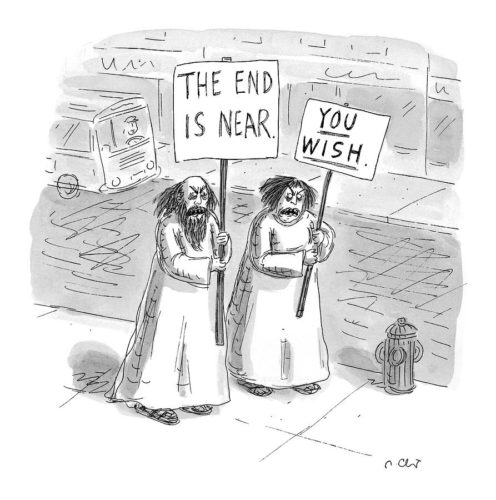
One of the more memorable bits of Zahl family shorthand was introduced when I was a kid of eight or nine. We were visiting my grandparents in Florida one summer. A new library had just been built in their town, so we decided to seek it out on the first overcast day. We’d been given general directions and told we couldn’t miss it. But this was pre-GPS, and the driver of the vehicle, well, let’s just say he’s a better theologian than a navigator.
We quickly got lost, and flagged down a pedestrian. “Sir, we’re looking for the new library. Do you know where it is?”
He paused and put his hand on his chin, really mulling it over. Uh oh. After a few moments he responded with utter sincerity, “Well, it might be that way,” pointing to his left. “Or,” he continued, “it could be that way,” pointing to his right, the complete opposite direction. Um, thanks?
Thus, over the years, every time one of us is baffled by circumstance, or flummoxed about what direction to pursue, someone trots out that old chestnut, “Well, you could either go that way. Or possibly the other way.”
 The phrase has been in the forefront of my mind these past three months. I smile every time I remember that we put out The Future Issue of our magazine … in February. Such sweet irony! A sermon illustration in real time.
The phrase has been in the forefront of my mind these past three months. I smile every time I remember that we put out The Future Issue of our magazine … in February. Such sweet irony! A sermon illustration in real time.
Certainly none of us predicted where we’d be in a few short months. I mean, just now, before watching an interview with rapper Killer Mike in which he urged protesters to stop looting, YouTube showed me an advertisement for a product to help with “mask breath.” I don’t know what part of that was more unexpected.
Indeed, there are many ways to characterize what we’re experiencing right now; “unforeseen” is one of them. Sure, some people may have had an inkling that “we were overdue.” But I bet that even Bill Gates made summer plans he’s had to cancel. My wife and I look at one another on a daily basis in disbelief at it all, both the big and the small things we’re being forced to cope with that we never in a million years envisioned.
Given the whiplash of current events, we all understandably want to know what comes next. No surprise then that every news outlet and pundit in the country — not to mention neighbor, colleague, and friend — has lined up to give us a fix of prophecy and sate our “Prediction Addiction”. Maybe it’s in regard to education, or live music, or indoor exercise, or pastoral ministry; the forecasts are coming fast and furious. Despite, you know, our near universal failure to foresee our present circumstances…
And I don’t think Addiction is too strong a term. After all, we know these predictions 1. almost always make us feel worse and 2. almost never come to pass–not exactly. But we still cannot. stop. clicking. I for one am dying to know what elementary schooling will look like this Fall and have gone down several late-night rabbit holes to that effect.
Enter Mark Lilla in the NY Times Magazine last week with his bluntly titled editorial “No One Knows What Is Going to Happen” in which he explores what’s beneath our crystal-ball compulsions:
People facing immediate danger want to hear an authoritative voice they can draw assurance from; they want to be told what will occur, how they should prepare, and that all will be well. We are not well designed, it seems, to live in uncertainty.
The history of humanity is the history of impatience. Not only do we want knowledge of the future, we want it when we want it. The Book of Job condemns as prideful this desire for immediate attention. Speaking out of the whirlwind, God makes it clear that he is not a vending machine. We must learn to wait upon the Lord, the Bible tells us. Good luck with that, Job no doubt grumbled.
Prophets today are less flamboyant [than the Oracle of Delphi]. Augurs have given up on sheep livers and replaced them with big data and statistical modeling. The wonder is that we still cry out for their help, given that the future is full of surprises …
The public square is thick today with augurs and prophets claiming to foresee the post-Covid world to come. I, myself have been pursued by foreign journalists asking what the pandemic will mean for the American presidential election, populism, the prospects of socialism, race relations, economic growth, higher education, New York City politics and more. And they seem awfully put out when I say I have no idea. You know your lines, just say them.
At some level, people must be thinking that the more they learn about what is predetermined, the more control they will have. This is an illusion. Human beings want to feel that they are on a power walk into the future, when in fact we are always just tapping our canes on the pavement in the fog.
In other words, the new few weeks and months could go that way — or, come to think of it, the other way. We’re all just that guy in the street.
Lilla closes the article with an endorsement of humility, which is sound counsel for any eventuality. To his way of thinking, an over-reliance on prediction makes a person less inclined to take action in shaping their future. We resign ourselves to some fate that doesn’t necessarily have to be. Fair enough.
From a low-anthropology point of view, Lilla is 100% right. We are terrible at predicting tomorrow, partly because we are terrible at playing God. We lack the skill-set, as they say. We see, at best, “through a glass darkly” — not just when it comes to the world around us, but our own hearts as well. I mean, even before COVID, and before Minneapolis, who of us is where we thought we’d be five, ten, fifteen years ago? Maybe a few people who were in medical school?

And yet, the opacity of the future is not necessarily a bad thing. Surprise may be a vehicle of disaster, but it can also be a vehicle of grace. Most of the best things in my own life were gifted, not engineered.
Thankfully, the Christian faith deals in promises, not predictions. Predictions have to do with the facts on the ground — interpreting them correctly, even when we, by definition, never have access to all of the evidence. Promises, on the other hand, have to do with the one doing the promising.
No wonder Jesus warns us explicitly not to worry about the nitty-gritty of what will happen and when. Instead, in this week’s lectionary text, he delivers a promise: “Remember I am with you always, to the end of the age.”
Our hope, in other words, is not attached to a prediction. Those are human inventions, meant to reinforce our sense of control.
A promise, however, especially one predicated on the authority of Another, allows us to deal with the present as it is, not as we need it to be. To see other people as suffering individuals, not variables in some framework or narrative. That promise may even free us–momentarily–from our apprehensions about a future that will never come to pass, re-energizing our efforts at healing the here and now, however dire or hopeless that project appears to be.
As Simeon Zahl so beautifully reminded us in the final of our video devotionals, the horizon of Christian hope lies beyond what we can see at any given moment. It is not limited by provisional authorities and rapidly shifting facts, but rooted in God’s unique ability to create something (good) out of nothing, to bring new life from death and grief, even birth faith in the hearts of those addicted to prediction.
Grace in the Time of Corona – Simeon Zahl from Mockingbird on Vimeo.

COMMENTS
3 responses to “Bottoming Out on Prediction Addiction”
Leave a Reply













So good Dave. And Simeon. And “most of the best things in my life were gifted, not engineered.”
As a really old guy, I verify.
So good yall. Now I want to hear what your Dad has to say about these times????
Excellent!